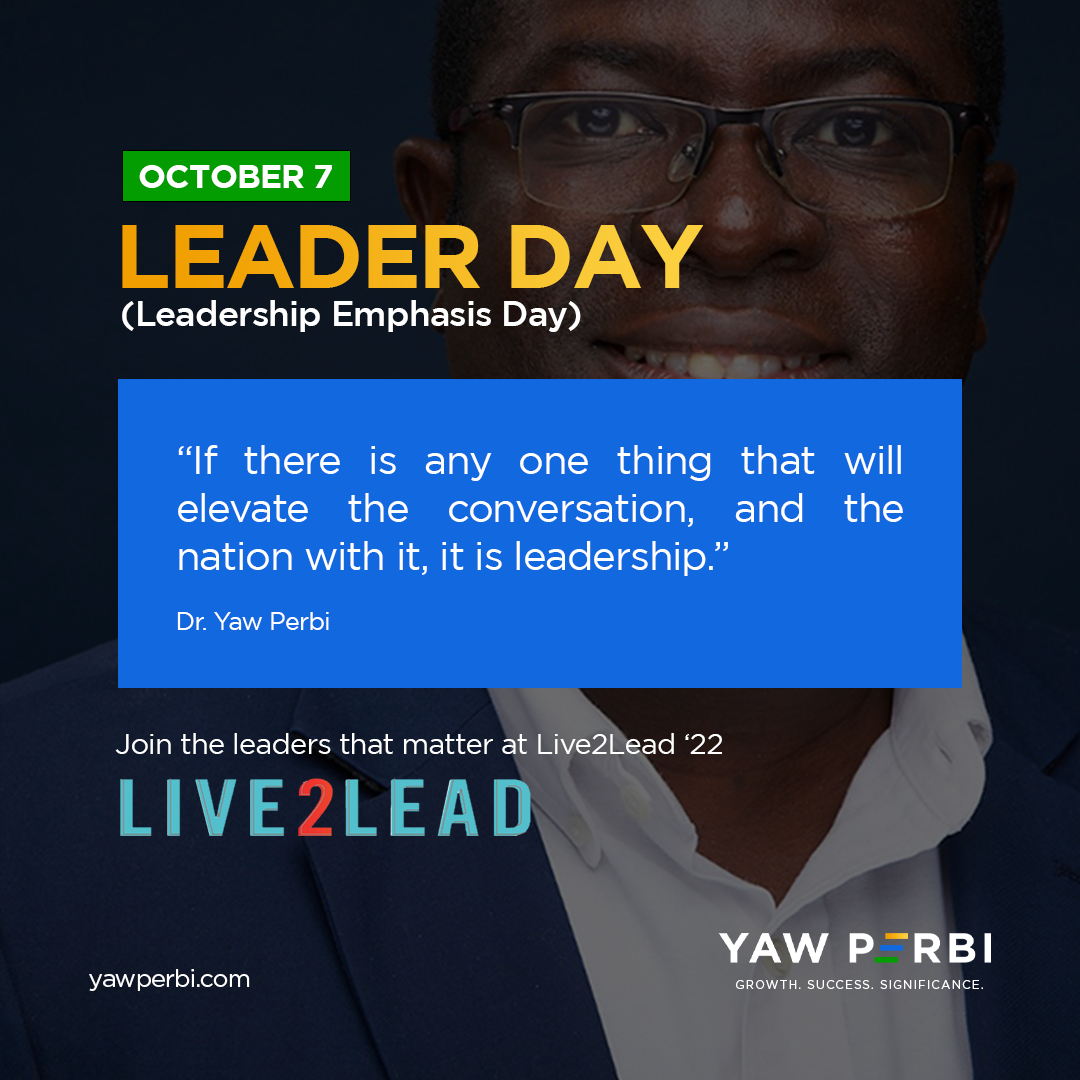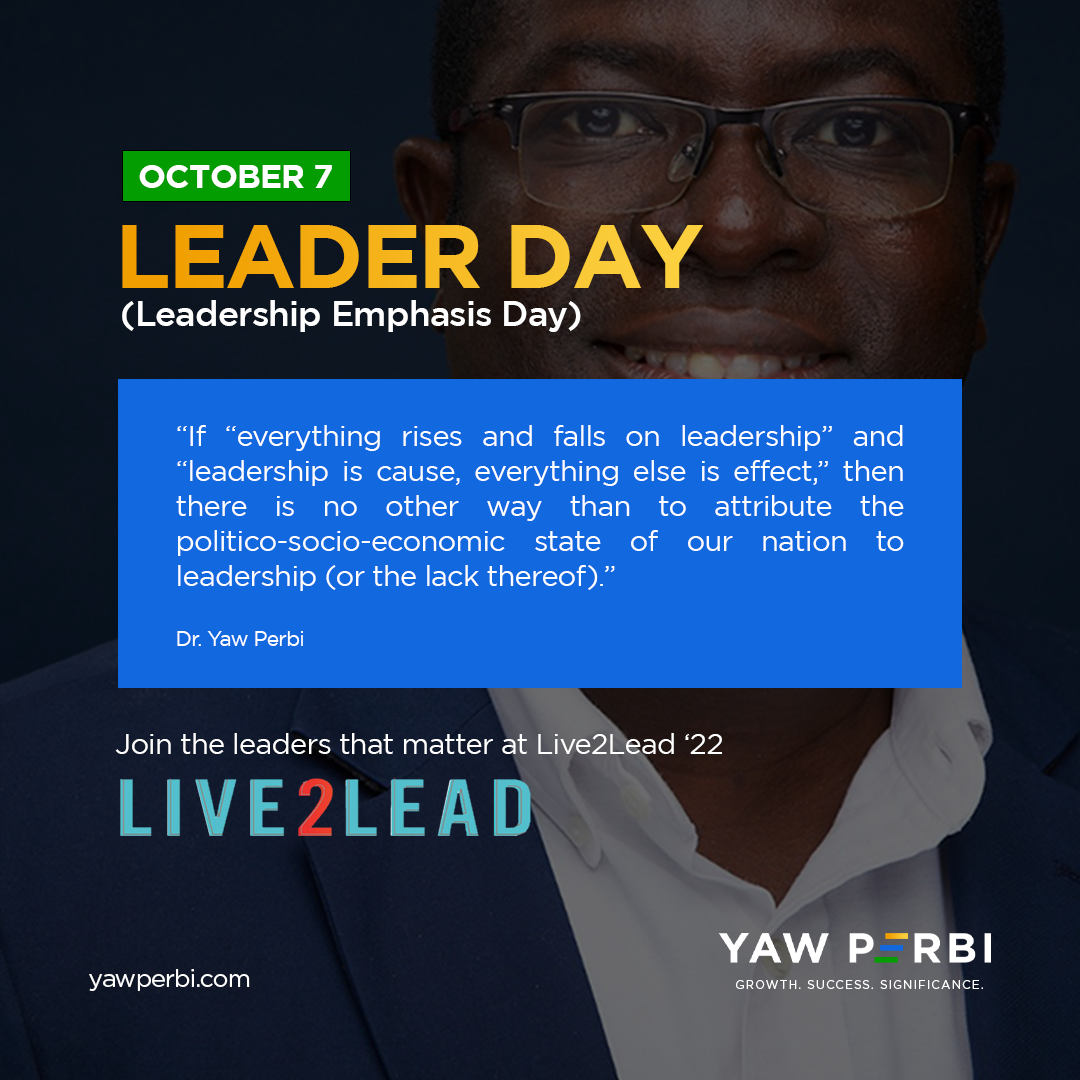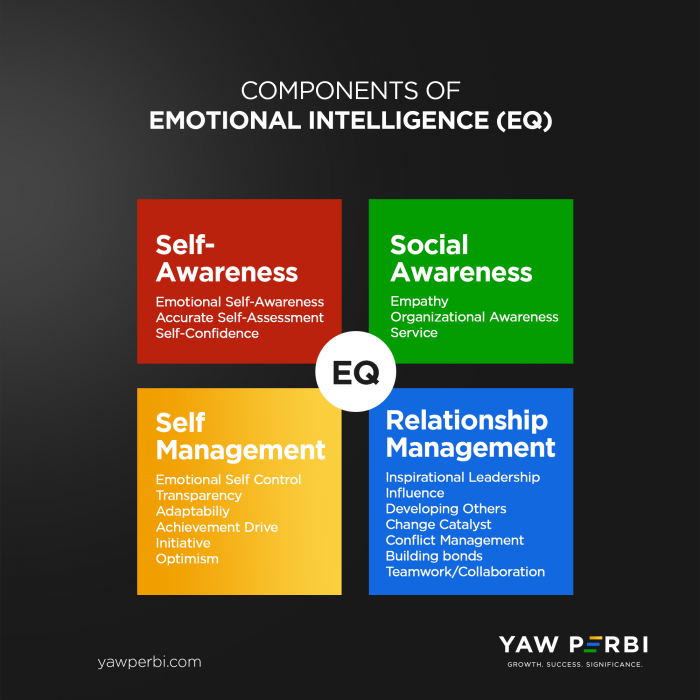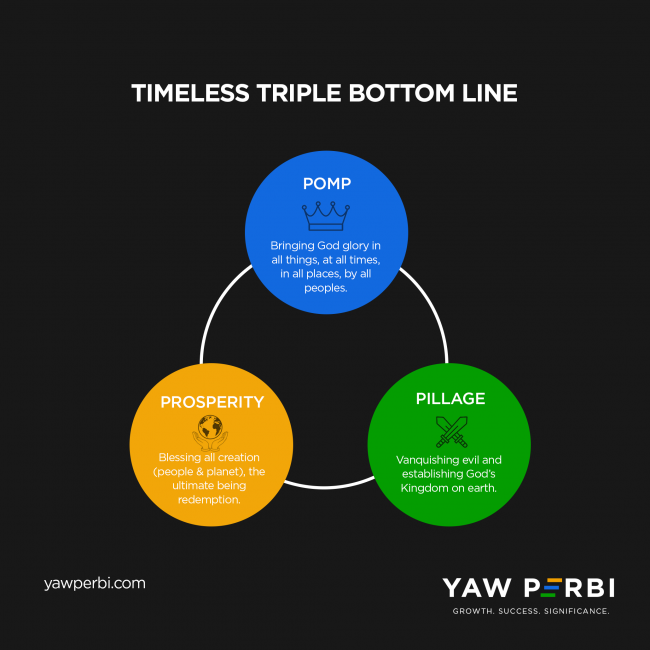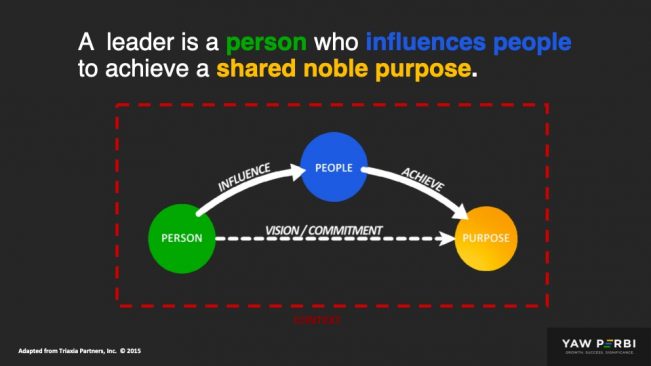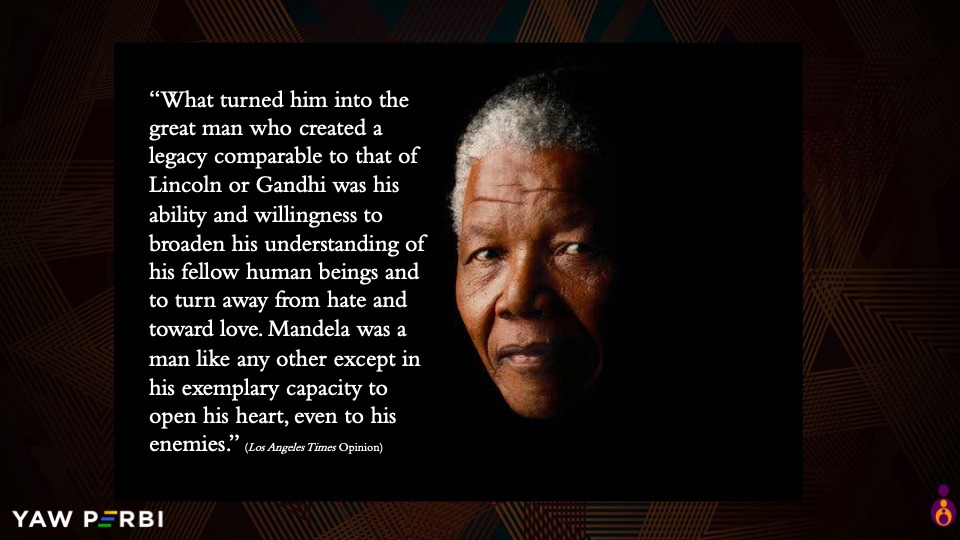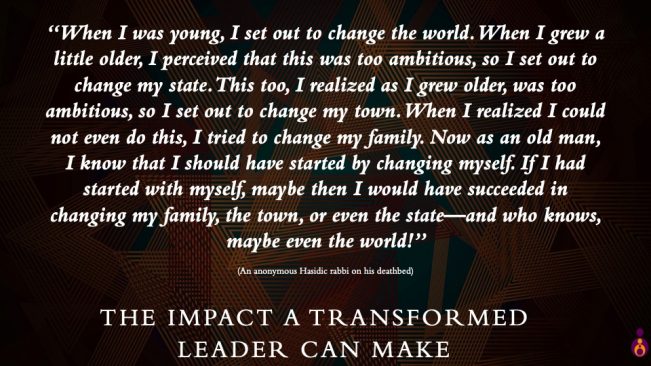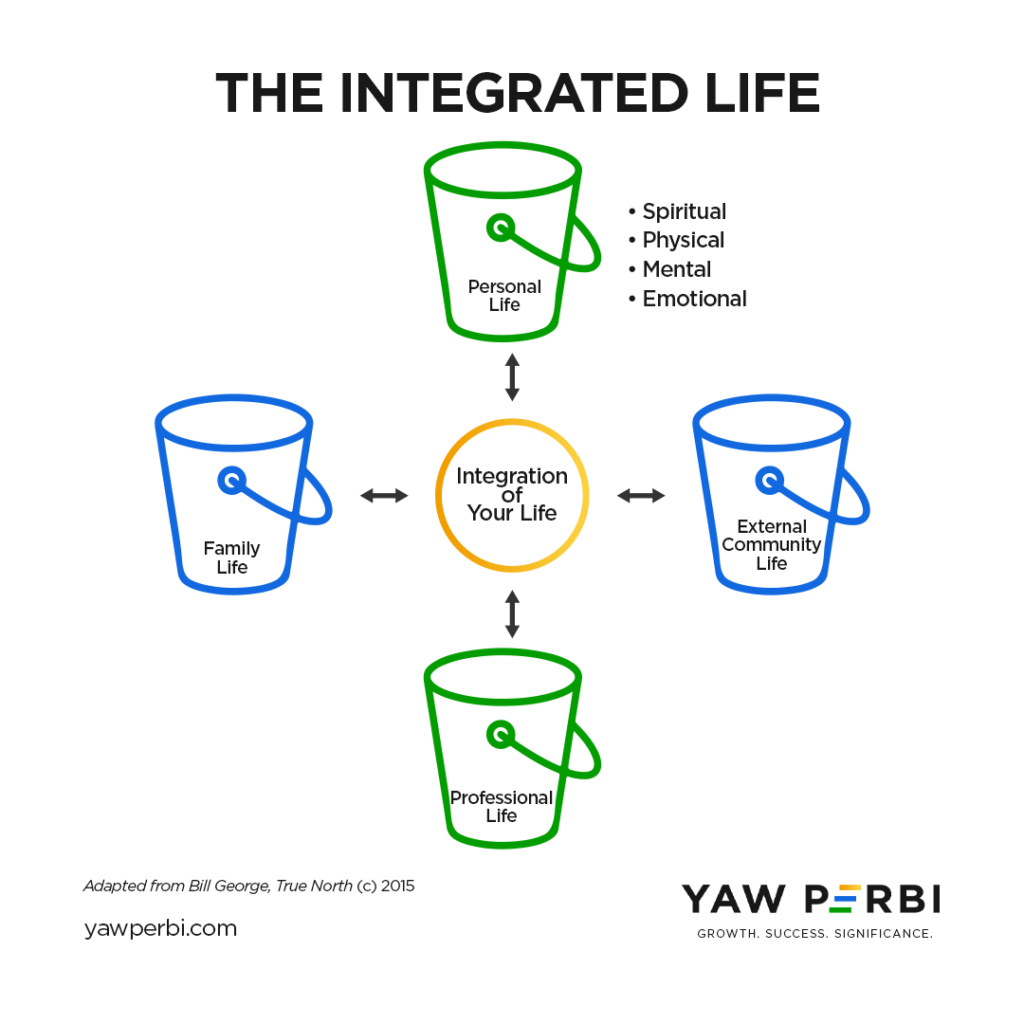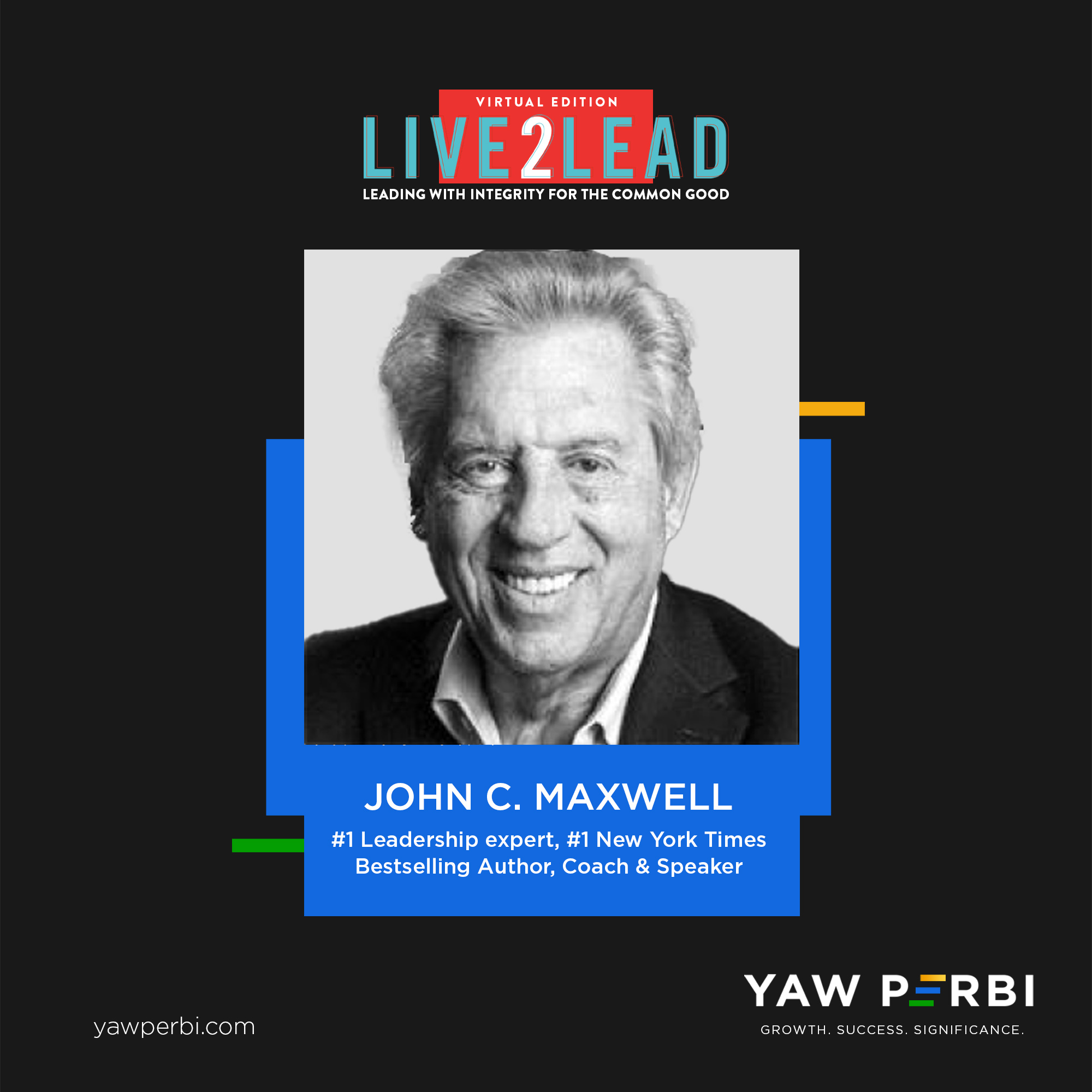
Meet John Maxwell, Mentor Emeritus
No single individual has influenced my leadership paradigm and praxis like Dr. John C. Maxwell. I started reading and understudying John in the late 1990s and have been teaching his materials ever since, both as a bonafide EQUIP trainer and a certified Maxwell coach/speaker/trainer on the John Maxwell Team (JMT).
Meet John Maxwell–my mentor emeritus–the #1 New York Times bestselling author, coach, and speaker who has sold more than 30 million books. John has been identified as the #1 leader in business by the American Management Association® and the world’s most influential leadership expert by Business Insider and Inc. magazines.
Dr. Maxwell has also received the Horatio Alger Award, as well as the Mother Teresa Prize for Global Peace and Leadership from the Luminary Leadership Network. His organizations—The John Maxwell Company, The John Maxwell Team, EQUIP, and the John Maxwell Leadership Foundation—have trained millions of leaders from every nation in the world.
The annual Live2Lead conference is John’s brainchild, and he always opens and closes, with other phenomenal faculty sandwiched in between. I have been privileged to host it on both sides of the Atlantic, in Montreal, Canada as well as Accra, Ghana.
LAWS OF COMMUNICATION AND LIMITS-BLOWING CONTENT
At Live2Lead this year, John C. Maxwell will be sharing new content from his upcoming book on the 16 Laws of Communication. Maxwell explains how to identify, grow, and apply your critical capacities. Once you’ve blow the “cap” of your capacities, you’ll find yourself more successful in your daily life.
We are absolutely convinced at YAW PERBI Executive Leadership Education that leadership (including communication) is taught; not just caught. Join John and the stellar faculty he’s put together for this year’s Live2Lead conference and up your leadership game. Register now through this link. Impress upon your organization to join the movement that will transform society by becoming a Patron of Live2Lead. A Patron company or individual is one that sends at least 10 leaders to Live2Lead. Together we can change our world for the better!
Register HERE, NOW.

Raise the Roof, Lift your Lid!
I just arrived at my room in Cape Town after three flights from Accra to Nairobi, Nairobi to Johannesburg and Jo’burg to Cape Town. A question on my mind as l flew here far above sea level, sometimes as high as 38,000 feet, has been, “How high is your leadership lid?”
THE FIRST OF THE IRREFUTABLE LAWS OF LEADERSHIP
Of course you know what a lid is, the cover of a container. How high your lid is determines the quality of the leadership that you provide for those you lead. I learnt this a long time ago, some 20-25 years ago from John Maxwell’s 21 Irrefutable Laws of Leadership. It was the very first of the principles of leadership he espoused in that bestseller and my life has never been the same since.
As John challenged me then from the written word—and many years later in-person—I must always endeavour to lift my leadership lid because no family, organization, church, community or country would ever grow past their leader. The leader is the lid over those (s)he leads. Sometimes when training leaders I ask, “are you a leader or ‘lidder’? because a leader is literally the lid on the progress and prosperity of their constituency. In a sense, every leader is a lidder; the question is “how high?”
IMAGINE THIS PRESIDENTIAL LID
You probably have heard me tell the story of a certain African president that a group of us, Maxwell certified leaders, were trying to connect in-person to John C. Maxwell for a national transformation process and programme. This president had never heard of John. In all probability, he hadn’t read any other contemporary leadership experts but hopefully he has digested at the very minimum some of the leadership classics like Plato’s, ‘The Republic’. It is a scary thought that this African nation—and by extension every family, organization, corporation, community, church etc. within her—would be constrained by the tightness of this head of state’s lid. I almost added, “through no fault of theirs,” but I guess they voted him into power.
HOW TO LIFT YOURS
While we educate a new generation that should be too enlightened to allow such tight lidders to lead African nations in the next decade, let me ask you, let’s get personal: how high is your lid? We forget, many of us (or we might even not know), that leadership is not just caught, it must be taught. And that’s why I love the opportunity, come October 07, for us all to be part of a life-altering, lid-lifting Live2Lead virtual experience with local faculty and global ones beaming all the way from Atlanta, Georgia.
We are gunning for 2,000 leaders—from emerging (youth) leaders, through leaders in the establishment (i.e. government/public sector leaders) to established leaders in the private sector, including executives from the corporate space. We will be taught in word and deed by powerful speakers and shakers like John C. Maxwell himself, two Patricks (Lencioni of the USA and Awuah of Ghana) and a Patricia (CEO of Vodafone, Ghana).
RAISE THE ROOF!
One of the most powerful discoveries in psychology over the last generation has been that people can learn and grow and change! So wherever your lid is today, if you learn to lead better you provide more room for those you lead. John will be the first to tell you that “your capacity determines your impact.”
Perhaps, some of the conflicts you are experiencing right now in your organization, church or wherever you lead is because your lid is too low and so people keep hitting it. And there is going to be continued tension and banging (conflict) till at some either you leave the stage or your people take their exit. As you have probably heard it said, people join organizations but they leave people (managers/leaders). It’s time to make room, lift your lid, raise the roof!
I have been part of things l left because the lid was too low. It just wasn’t life giving and l know people have also left my leadership when my lid was low because it was just too tight. Learn to lead. Each one of us can learn to lead better. Blow off the lid so that all of a sudden the people under your leadership feel this space and freedom because you lifted your lid and now they can breathe and create and innovate and… live again.
Join us at Live2Lead Ghana 2022, on October 7, and let’s all learn to lead better so that the people following our leadership can live better. If leading is your purpose on earth—that you live2lead—then you might as well as learn2lead, and do it well. As Donewell Insurance puts it, “If it must be done, it must be done well.” If we must lead, then we must lead well. Let’s blow off some lids and see our constituents blessed beyond measure, growing great and strong.
Right outside my hotel room window is the breathtaking view of the majestic, towering Table Mountain at 3,500 feet above sea level with no real ‘peak’ per se. No lid! So in the meantime, while you contemplate your lid, I will enjoy Cape Town on your behalf.
Post Script
Register and join LivetoLead here.
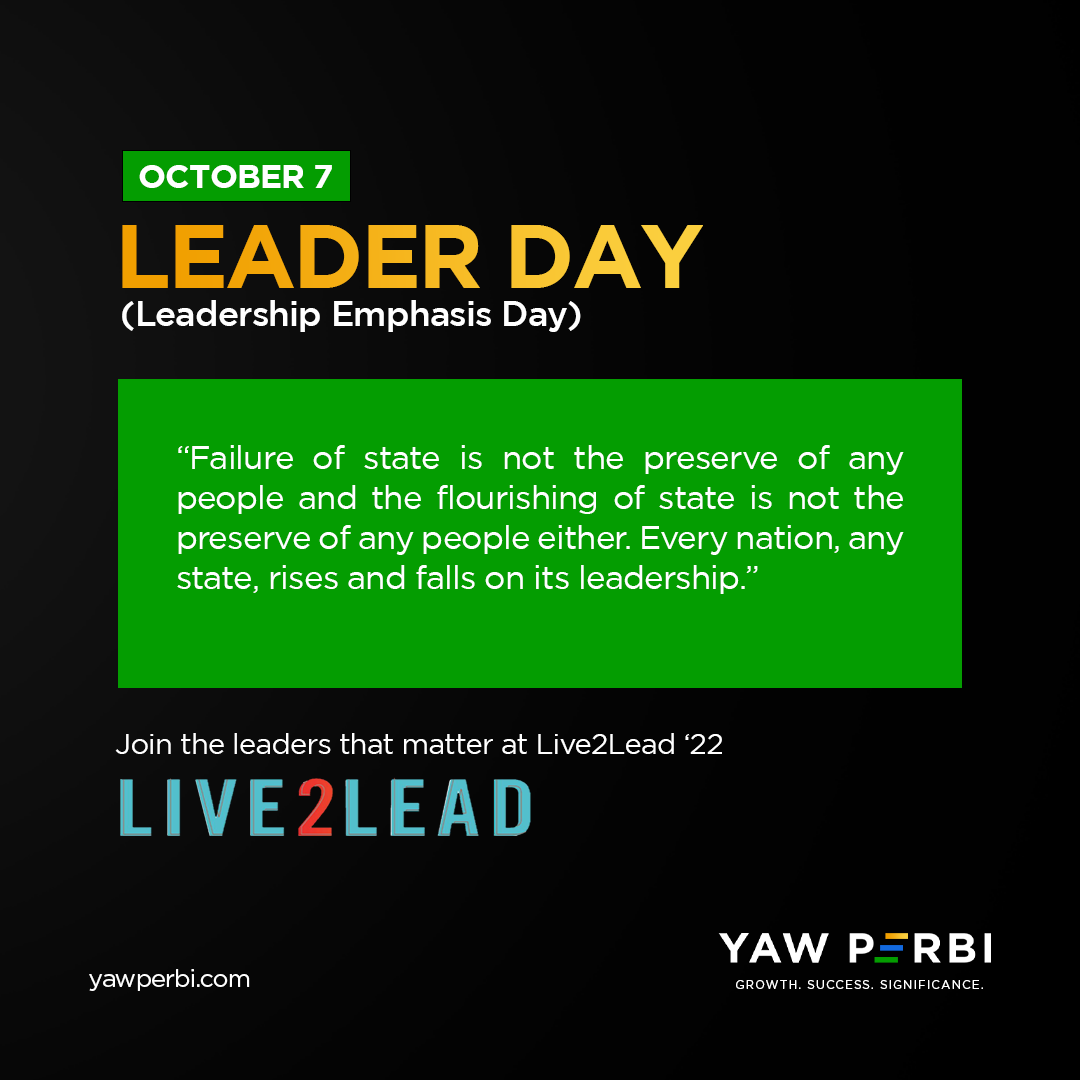
Of Principles, Principals & Principalities
This is a true story: A few years ago, a handful of us John Maxwell-certified coaches and trainers from Africa were trying our possible best to get John, the world-famous leadership expert, to visit a particular African country and engage their president. A good number of Maxwell-certified leaders have been travelling with John to specific developing countries to engage them in a bottom-up transformation process that have done these nations some real good and we hoped same for this African nation with great potential. But John doesn’t come cheap. In fact, one of us was serious enough about this that he cashed in part of his 401k (retirement savings in the U.S.) to make this trip possible. It was such a struggle to gain access to the president, like pulling teeth! Eventually we did. To my ‘shock and awe’ (just remembering U.S. President Bush Jnr.), this African president did not even know of John Maxwell! That is when I knew the country wouldn’t do well. And I was right.
LEADERSHIP IS THE TIDE
Over the last few years, especially with the Trump presidency and with the advent of social media proliferation, many of us have seen parts of the United States that we have never seen before. Horrible parts and horrific things—whether it is the wicked knee of a policeman on George Floyd’s neck or violent street protests or the infamous January 6 ‘insurrection’ or whatever it is. We had all this exposure to things we could not hitherto have imagined occurring in the ‘greatest nation in the world.’ At the peak of these happenings, during the Coronavirus pandemic, I frantically tried (see January 2021 article) to get some of my American friends to appreciate that Africans are no less human or merely more stupid than they are, and that if there is a difference between their economic status and my motherland’s it was just because, “everything rises and falls on leadership.” Leadership is the tide the raises all the other boats in a society (or otherwise). Most of them, I perceived, didn’t still quite get me.
AFRICA IS NOT THE PROBLEM
Just like we’ve seen in the last few years in America, we’ve also seen in several countries in Europe how “leadership is cause; everything else is effect.” I’ve lost count of how many Prime Ministers Britain has had in the last little while, and we all witnessed with horror the leadership (or the lack thereof) of the last one with the Russian first name. Africa is not the problem, leadership is. Failure of state is not the sole preserve of any nation neither is the flourishing of state the preserve of any nation. Every nation, any nation, rises and falls on its leadership.
“WE THREE KINGS”
These three kings are at work in nation building: Principles, Principals and Principalities. If you like, these actors are Laws, Leaders and Luciferites. Principles are neutral, Principals are supposed to be working for their people while Principalities are against. There are principles that touch on every aspect of life, including leadership. When these principles or laws–which are timeless, universal truths–are lived out, nations do well, families flourish, churches and organizations prosper. When they are broken we don’t.
It is easier to appreciate the physical and chemical principles because we can see and feel and touch them and their consequences. The Law of Gravity is the commonest example of a principle of Physics (physical law). There are leadership principles as well. Many of these are intangible in their operation but produce very tangible effects reflected in socioeconomic and other indices. Nations that live by principles, these consequential laws of the universe that make this world run properly, prosper and nations that do not live by principles don’t. The nations whose principals (leaders) live by these principles prosper; those that don’t do not suffer. It bears repeating that this applies to families, communities, churches, organizations… you name it.
WHERE DEMONS COME IN
Of course, those of us who believe in spiritual things know that over every nation and territory there are also what we call Principalities (Lucifer’s forces). These ‘Luciferites’ (I call them), are spirits that have territorial control that want to oppress nations and not let them come to their full manifestation. Why, you may ask? Out of envy of humans and out of spite for their Creator. But guess what? If you have principals (leaders) who live by principles (laws), including spiritual principles on how to deal with these powers, those nations, those families, communities, churches, organizations and countries of such leaders would bloom.
STOP THE BLAME GAME, NOW
Africans! let’s stop blaming how socioeconomically bereft we are on Principalities. It is our lack of following Principles—all of us—and particularly the lack of our principals leading in a principle-based manner as they should that has landed us where we are. We have an opportunity on October 7, all of us, to learn more of these principles as principals, whether we are executives in companies, pastors of churches, student leaders, public sector actors or whatever. We must all learn to lead better. When the leader gets better everything everyone else gets better.
It’s time to take on the principalities (Lucifer’s powers) that are oppressing and not making us prosper as nations and communities and it would come from the principals (leaders) who would live by the principles (laws) of leadership and lead the rest of us to do same. Don’t blame the principalities—and you can’t blame the principles either—it all lies on the principals. Principles are fundamental laws that cannot be changed and must be lived by to prosper. Principalities are spiritual powers that can be challenged to let things “be on earth as it is in heaven.” Neither principles nor principalities are respecter of persons, whether principal or peasant. Nations with great principals (leaders) abide by principles (laws) and defy spiritual principalities (Luciferites) to make their nations prosper. How laudable is your leadership?
Remember the nation whose principal-in-chief was clueless about leadership principles, at least as taught by Maxwell? I feel sorry for his people as I see and hear of their plight each day, worsened by the Coronavirus invasion of our planet. It’s not the devil; it’s our leaders. As one medical colleague pursuing Paediatric Pulmonology in South Africa poignantly commented on my PEP Talk on YouTube about this matter, “Once our Principals follow Principles and we the led are inspired, we will be too busy prospering to blame Principalities.” Enough said. Are our principals hearing?
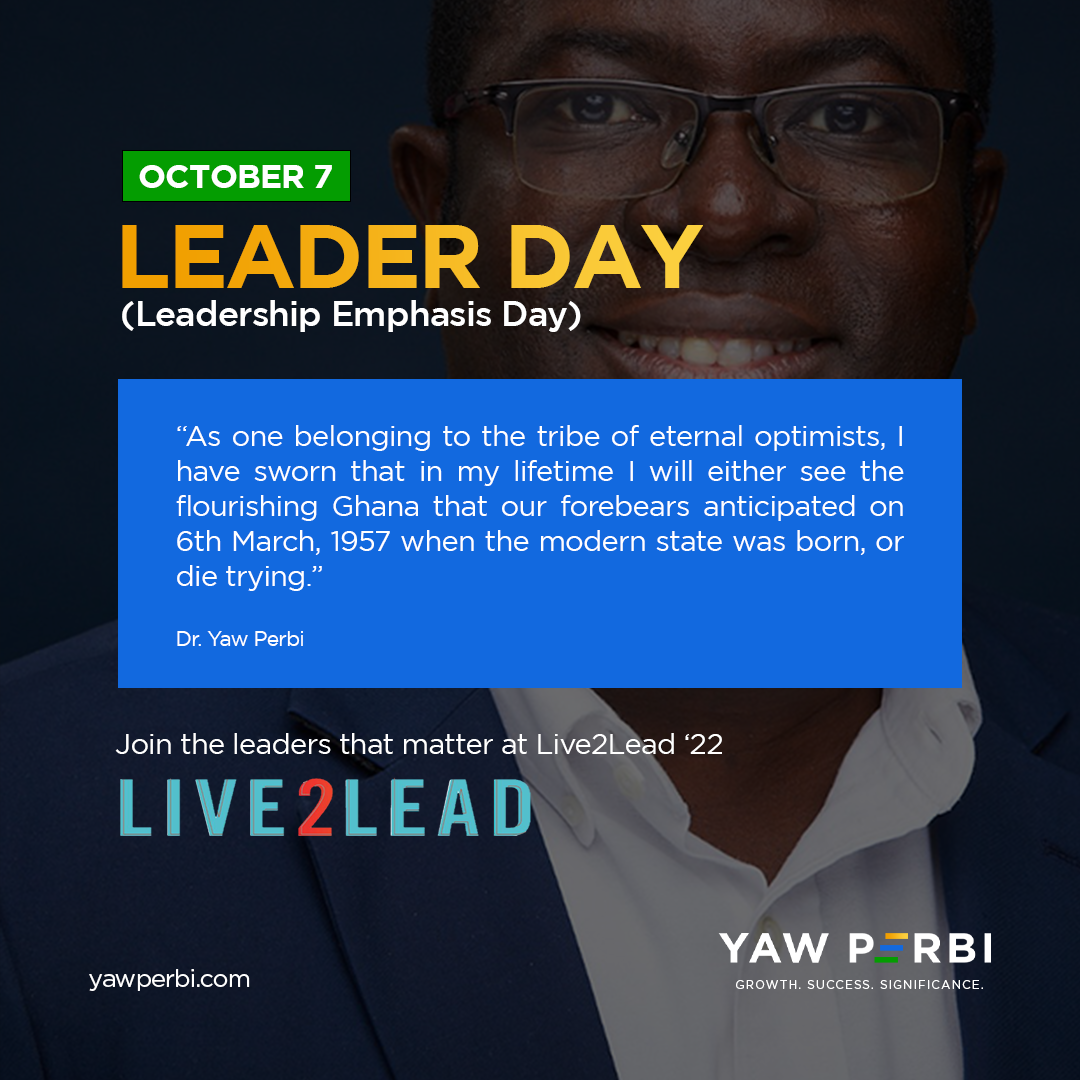
Leader Day, October Day
The world is not in a good place. Leadership is the cause. And when it comes to Ghana’s situation in particular, I have personally been shocked at the number of C-level leaders I have interacted with that have either completely lost hope in the future of the country or nearly have. “How did we get here???” one CEO of a major bank asked me via text (yes, with three question marks).
If “everything rises and falls on leadership” and “leadership is cause, everything else is effect,” then there is no other way than to attribute the politico-socio-economic state of our nation to leadership (or the lack thereof). In the same way, if there is any one thing that will elevate the conversation, and the nation with it, it is leadership.
DO OR DIE TRYING
As one belonging to the tribe of eternal optimists, I have sworn that in my lifetime I will either see the flourishing Ghana that our forebears anticipated on 6th March, 1957 when the modern state was born, or die trying. When the nascent nation was named ‘Ghana,’ our great grandparents were hopeful it would reflect the prosperity of the old Ghana empire, hence our new name (from Gold Coast). Oh, it bears repeating: our tribe of eternal optimists will see to a prosperous Ghana in our lifetime or die trying.
“I HAVE A DREAM, I HAVE A DREAM…”
Every true leader has a dream they passionately pursue with their people. I realize there is a day dedicated to almost every cause under the sun and pretty much each of the Sustainable Development Goals (SDGs)—women’s day, water day, literacy day, friendship day, founders day … even toilet day. Yet the one thing that causes each of these matters to rise or fall has no such day dedicated to it to elevate and emphasize it. Even then, is a day enough? Surely not; but it is a good catalyst for the remaining three hundred and sixty four (or five) days.
My fellow Maxwell-trained and certified collaborators in Ghana and I have a dream that ultimately the first Friday of October each year will become universally known as LEADER DAY. There is nothing special about the first Friday in October per se except that consistently for about a decade now, our mentor and leadership expert, John C. Maxwell, has been gathering some of the best leadership minds and hearts on the planet to speak to the issue, and we might as well leverage the opportunity rather than reinvent the wheel. Live2Lead is the name of that event. The name says it all, that’s our purpose on earth: We live to lead.
Gwen Addo, the pulchritudinous CEO of the Hair Centre and speaker at Live2Lead Ghana ‘22 affirms this vision: “I also pray your dream comes true and October 7 becomes a “leadership day” or perhaps October becomes a “leadership month.”” She continues, “leadership is close to my heart … and why not dream it bigger than just a day.”
You and I know the dearth of leadership in our country. We, Maxwell certified trainers who are Ghanaian, are aiming to get 2,000 leaders at all levels to benefit from the LIVE simulcast from Atlanta. We will organize local content for our context first, sandwiching the global feed. You would want to be with Patrick Awuah (Founder & CEO, Ashesi University), Patricia Obo-Nai (CEO, Vodafone), Uncle Ebo Whyte (CEO, Roverman Productions), Gwen Gyimah Addo (CEO, The Hair Senta), Kathleen Addo (Chairperson, National Council for Civic Education) and Kwamina Asomaning (CEO, Stanbic Bank). The core issue on the table this time, or shall I say by the fireside, is “Leading with Integrity & Inspiring Hope, for the Common Good.”
STRATEGY
On October 7, we shall convene 2,000 Ghanaian leaders online. At least half of them will be from 100 companies, institutions and organizations which would send 10 of their leaders to Live2Lead as their investment in themselves as well as boldly staking their claim in the prosperity of Ghana by raising the leadership lid in the country, one company at a time. All these companies will be listed as patrons in the event handbook, website and social media (in alphabetical order).
The other half will be made up of executive leaders from the private sector, the establishment leaders (public service) and emerging leaders from our schools and universities, representing the next generation. Companies, institutions and organizations which want to go beyond patron status will be given opportunity to sponsor the establishment and emerging leaders in exchange for significant air time and eyeballs.
This 2,000 is only for starters; we shall double in 2023; and double again and again till at least 2% of all leaders in Ghana are connected to this Live2Lead tribe of learners who lead and leaders who learn. That is the exact critical mass needed to see a self-propagating movement of leaders worth following in Ghana: 2% of the leader population.
CONCLUSION
The feedback from the ground as I have gone around is damning. Ruinous to the extent that although the theme we initially chose for our local content is ‘Leading with Integrity for the Common Good,’ we’ve had to come up with a conjoint theme of HOPE. Our people need hope. Leaders are brokers of hope, thus when they themselves are broken to the extent that they have no hope, what shall the rest of the people do?
Arise Ghanaian leaders!, established and emerging ones alike. We are better than this. Yet perhaps we are expecting leadership behaviours, values and attitudes that we haven’t first trained into people. Since we Live 2 Lead (that’s our purpose) let’s then Live 2 Learn (that’s the process) so we can all lead better and all make our nation great and strong. When the leader gets better, everyone and everything else does too. So let’s all show up!
One day in October, for starters. Just one day but who knows? Perhaps ‘October Day’ will in my grandchildren’s day be as well-known as ‘May Day’ is today. And for even better reasons, leadership-wise.
PS.
An event is not enough for sustained transformation thus there are leadership development and training pathways that will later be shared as a follow-up process between October 7 and the next Leader Day a year hence.
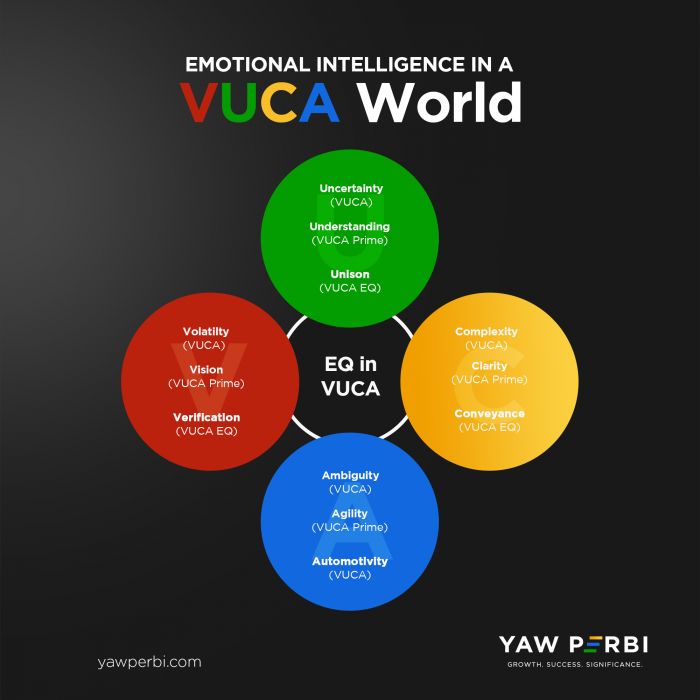
SO YOU THINK YOU CAN LEAD WITHOUT EQ IN A VUCA WORLD?
As one of the Pan African Cohort facilitators of BCA Leadership, I just got off a scintillating Zoom call with amazing African C-level leaders from across the continent—East Africa (like Kenya and Uganda), West Africa (I recall Nigeria, Sierra Leone and Ghana), North Africa (Egypt) and Southern Africa (Malawi, South Africa). We talked about Emotional Intelligence and the whole idea of VUCA. The goal of this blog is to summarize the essentials of the topic, which most participants described as ‘intriguing’: “So you think you can lead effectively without EQ in a VUCA world?” Really, this is a rhetorical question because no one in their right senses would say, “Yes, I can lead effectively without Emotional Intelligence (EQ)” in the first place, let alone in a world that’s described as VUCA.
WHAT ON EARTH IS VUCA?
VUCA is a term that came from the military space, especially at the end of the cold world war when without the two clear polarizing forces the whole world was described as Volatile, Uncertain, Complex, and Ambiguous. Guess what? If the end of the last century was said to be VUCA then imagine just how much more VUCA it is now. Look at the volatility of the world today, look at the speed of transformation, the dizzying digital economy. Consider the uncertainty with COVID-19 and this post-pandemic world. Is it even a post-pandemic or rather para-pandemic world as in some places it seems over and in others, COVID is still raging? Look at the complexity of the world. How could a microscopic virus emerge in a small place in some corner of the world called Wuhan, China, and the whole world gets grabbed into this? Some things are just ambiguous right now. It’s a VUCA world. There wouldn’t be enough space to write out all the feelings these VUCA times have generated in people, especially anxiety.
HOW ABOUT EQ?
Even before the VUCAness of the world, Emotional Intelligence had been identified as the key thing for succeeding in leadership. It is archaic 20th century thinking that IQ (intelligence quotient) makes a good leader for a total leader not only has IQ, in terms of book smarts or cognitive intelligence, but also Emotional Intelligence (EI/EQ) in terms of being intelligent about feelings and Global Intelligence (GQ). Humans like to think we are rational people but at the end of the day we are emotional beings. The term was first coined in 1990 by researchers John Mayer and Peter Salovey, but was later popularized by psychologist Daniel Goleman five years later.
We now know that 80-90% of success in Executive Leadership depends on Emotional Intelligence and not cognitive intelligence. Don’t get me wrong, I am not dumb. I am a medical doctor for crying out loud. Intelligence is important but guess what? When it comes to Executive Leadership, IQ only gets you into the door, it takes EQ to play the game. And win. After about 128, IQ doesn’t matter anymore! Given the same level of IQ, technical skills, and competence, it’s EQ that would make all the difference in how much one succeeds (or not).
Emotional intelligence, according to Psychology Today, is “the ability to identify and manage one’s own emotions, as well as the emotions of others.” It is thus made up of the following four blocks:
BUT THERE’S PROBLEM
So being the amazing leaders we are, we figured out we cannot just sit idly twiddling our thumbs and watch VUCA happen without responding. In 2007, one Robert Johansen (a distinguished fellow at the Institute for the Future), came up with a behavioral leadership model he called VUCA Prime to counteract each of the four elements of VUCA with a specific positive response which starts with the same four letters. VUCA Prime then is to have Vision over Volatility, to overcome Uncertainty let’s have Understanding, then Clarity over Complexity and to overcome Ambiguity let there be Agility.
Well, I have been studying this since the pandemic began and was thinking recently how good VUCA Prime is but how so very cognitive it is! Why is VUCA Prime so cognitive and does not take enough emotions into cognizance especially when we know 90% of success will depend on a leader’s emotional awareness (of self and others) and responses?
WHAT IS VUCA EQ THEN?
Consequently, I have designed something called VUCA EQ to provide a more comprehensive and potent leadership response to VUCA beyond the cognitive, one that significantly takes emotional intelligence into consideration. Like VUCA Prime, each of the VUCA EQ responses also begins with the same four letters.
Firstly, V is Verification: we need to be able to decipher what our emotions are and label them correctly. Then we need to be able to do the same for others as well so we can respond rather than just react, and we can manage our emotions and that of others instead of just trying to control them. The world of command and control is gone!
Secondly, instead of Uncertainty and just responding with the cognitive Understanding that VUCA Prime proposes, we rather respond in Unison. What I mean by Unison is to respond with our three brains. You have the cognitive brain but you also have your emotional brain called the limbic system. EQ is not just a ‘heart’ kind of thing, no! Emotional Intelligence has to do with the brain too. Or even more annoying, called ‘soft skills.’ EQ produces hard results on the balance sheet and cashflow statements! There is the Cognitive brain, Emotional brain, and Instinctive brain and VUCA EQ is about responding with all three in unison.
For Complexity, not only overcome with clarity but with Conveyance. Powerfully transmit emotional then logical information and carry across values and perspectives, considering emotional data and communicating emotions first. Remember to start with emotional data when decision-making and communicating eg. I feel vexxed about this decision and I’m aware most people in the company feel anxious…. Connect with emotions and convey them in response to complexity.
Then finally, for Ambiguity, not only thrive with agility but by Automotivity. In other words, learn to move people’s emotions or move people emotionally. Automotivity means containing within itself the means of propulsion or movement. Mobilize people in such consonance and resonance with what they want (motives) and how they want (motivations) that they move in a self-propelling manner. After all, why do you suppose feelings are called e-motions? Feelings move us, they move the world. We may not like to acknowledge it but they do. How do you learn to know people’s motives and their motivations so that you can ride on that to send them (better still, travel with them) to a place where they ought to go?
CONCLUSION
Leadership is in the transportation business. We move people from here to there and without the power of Emotional Intelligence to move people (think e-motions) towards a shared, noble purpose, we are going nowhere ourselves in the first place and taking no one with us for that matter. Don’t you ever think you can successfully lead, especially in this VUCA world, without Emotional Intelligence.

From One Legendary Leader in the Evening to Another One in the Morning–a Tribute to Archbishop Desmond Tutu

The beloved late Desmond Tutu (photo: Yaw Perbi does not own the rights to the picture and owner is unknown).
I was emailed this incredible tribute by a mentor of mine in the Lausanne Movement, Dr. Michael Cassidy, to his late friend Archbishop Desmond Tutu, that I just had to share as a student of leadership. What impresses you most? May many Cassidies and Tutus be raised in our generation!
Tribute to Archbishop Desmond Tutu
from
Michael Cassidy
Founder, African Enterprise
Honorary Chair, The Lausanne Movement
Archbishop Desmond Tutu, one of South Africa’s greatest ever luminaries, both ecclesiastical & national, has gone to be with His Lord. People from every race, sector & background will mourn his passing, because he was a man for all who stood without fear or favour for the human rights of all.
Perhaps it is as an almost unequalled African champion for human rights that he will be most fondly & universally remembered. And it was for this that he justly became a Nobel Laureate.
In South Africa his immensely courageous fight against Apartheid earned him the fearsome opprobrium of the National Party Government, the settled hostility of most whites, but the thankful adoration of all people of colour, as well as more liberal whites. In fact, from the church, his voice during those dread years, was by far the most audible, & his persona by far the most visible. This audibility & visibility constituted a true achievement of note & contributed powerfully to the final fall of Apartheid.
As far as we were concerned in African Enterprise, Desmond was a friend to our work & contributed powerfully to conferences we organized or helped organize such as SACLA (South African Christian Leadership Assembly), the NIR (National Initiative for Reconciliation), & The Rustenburg Conference which represented the whole church spectrum & spoke to the whole range of political leadership from far left to far right.
At a personal level I also counted Desmond a good friend. He commended numbers of my books, including my recent Memoirs, & wrote the Foreword to my book The Politics of Love. We also shared in significant ministry together in African Enterprise’s city-wide mission to Kigali, Rwanda, a year after the genocide. That was very moving. I especially remember ministering with him in terrifying cells of pitifully jammed together prisoners. And then being with him as he collapsed in tears in one church filled with skeletal remains of murdered victims. There I saw his profound compassion poured out. Even as we tried to hold him up. Such shared moments one can never forget, culminating in our sharing the evangelistic preaching to a packed stadium in our final service.
And all this Desmond could do in spite of the fact that we had strong theological differences on certain issues such as Universalism & Gay Marriage. But he never allowed those to damage our friendship. And neither did I.
Thankfully in our recently produced documentary, The Threatened Miracle of South Africa’s Democracy, Desmond features strongly, both during the Apartheid years, but even afterwards when he severely scolded the ANC of Zuma’s time saying, “I’m warning you; I’m WARNING you; you are a disgrace!” No one else had that truly prophetic courage, credibility & ability to speak to all sides, all the time, AND be heard!
Yes, we will miss him… “the Arch”, as he was affectionately known, even by the media. But his legacy of prophetic witness will live on wherever South Africa’s story is told, & wherever racial justice & the Human Rights struggle are in purview.
To his dear, always supportive wife Leah, to his family, to his ministry colleagues, especially in the Anglican Church, we in African Enterprise world-wide extend our deepest sympathies, & assurances of heart-felt prayers at this time.
Dear Desmond — Beloved Arch — thank you for blessing us with your life. Au revoir. We will see you in the Morning.
Michael Cassidy
Founder of African Enterprise

Are You Aligned with the Mission of God in the Marketplace?
Marketplace leaders of faith, it’s time to align. Since returning to Ghana, after several years mainly in Canada, that is a word I’ve heard a lot in my re-orientation: align. “Let’s align, let’s align,” I hear this quite often! CEOs want to align with their boards, other C-level executives need to align with their various teams, sales and marketing must be congruent, and everyone needs to align with the company’s vision, mission and values. All well and good.
Let’s elevate this alignment conversation as I dedicate this particular blog to marketplace leaders who are Christ-followers. The Christ-following marketplace leader does not, and indeed cannot, have the same motives and bottom line as someone who isn’t a Christ-follower. This week, I had the opportunity to speak to a group of emerging leaders on “Man with a Vision on a Mission,” which was essentially about the purpose of life. Dr. Myles Munroe of blessed memory once put it so poignantly, “The greatest tragedy in life is not death, but a life without a purpose.” Purpose is when you know and understand what you were born to be and accomplish, what something was made for. Or as they say in the French city of Montreal my family and I have been domiciled in for over a decade, raison d’être (reason for being). I’ve also held discussions with some of the C-level executives in the Ghana Club 100 from mining to fintech about purpose. (Ghana has christened the top 100 companies as the Ghana Club 100, akin to the Fortune 500 in the United States). These premium companies have profit, for sure, but how about purpose?
WHY WE ‘GO TO MARKET’
We are in business for profit, that’s the bottomline—or so we thought until a couple of decades ago, the concept of ‘Triple Bottom Line’ arose (thank you John Elkington) as a result of people pursuing profit at the expense of human well-being and the sustainability of our earth. The bottomline has since been triadized as Profit, People, and the Planet. That’s the triple bottomline. All three come together for holistic prosperity and complete sustainability.
Profit, is about acing financial performance, generating dollars for shareholders. By People we mean a focus on a business’s societal impact, or its commitment to human beings—within and without the company or organization. People are the other stakeholders beyond the shareholders (who are taken care of largely by profit). We mean people impacted by business decisions from customers and employees to community members. With all the talk about climate change and the like, companies are now tasked to also aim at making a positive impact on the Planet as they seek to capitalize on it to make profit.
Yet while all three are important to everyone in the market—of all faiths, little faith or no faith—I refer to the above treble as the temporal bottom line. There is a timeless triple bottom line, which is what I want to draw the attention of marketplace leaders of faith to.
MISSION IN THE MARKET
I’ve realized that we need a reorientation of why we’re in the marketplace, and what our mission is, as Christ-followers. I often tell people that if they don’t have a personal purpose statement, they wouldn’t know which company to work with or for because they won’t know if they are aligned. Your values must be compatible with theirs. Similarly, if you are a Christ-follower, your mission in the marketplace must be aligned with God’s mission.
What exactly is God’s mission? That’s the timeless triple bottom line I refer to. God is on a three-fold mission in the world:
1. Towards Himself—to bring glory to Himself. God gets glory when we reflect His good nature in our being and doing. He desires, and deserves, to receive glory also from the obedience, service and worship of all nations and peoples in every sphere of life, from Archaeology to Zoology. Are your life, leadership and work God-glorifying?
2. Towards creation—to bring a blessing to all created things. God is on a mission to bless all of creation, not just people. People, first and foremost, but all of creation is a candidate for God’s blessing. While the blessing would include the temporal financial profit, people’s prosperity and the planet’s care (triple bottom line), the greatest of blessing is all creation being freed from the penalty, power and presence of sin to be God’s friend once more, to worship and serve Him and reflect His nature lost once-upon-an-Eden again. So, the second-fold mission of God in blessing creation comes through in the 3BL of business, but there is a redemptive element that I dare to say is the most important. I say this because that will outlast how long profit, this planet and this life will endure. Are your life, leadership and work creation-blessing?
3. Against evil—to vanquish evil and establish His Kingdom on earth. Yes, your mission as part of God’s grand mission is to pillage evil to establish God’s righteous, just, and equitable Kingdom on earth forever and ever, as it is in heaven. Are your life, leadership and work evil-crushing and Kingdom-establishing?
PRAYER AT WORK
We see the above three-fold mission of God in the prayer Jesus taught his disciples:
1. Glory to Himself—“Our father in Heaven, Hallowed be your name… For yours is the kingdom, the power and the glory forever and ever, amen.”
2. Blessing to Creation—“Give us today our daily bread. And forgive us our debts (sins), as we also have forgiven our debtors.”
3. Against Evil—“Your kingdom come, your will be done on earth as it is in heaven… And lead us not into temptation, but deliver us from the evil one…”
Organizing prayer at work with like-minded, same-hearted folk of faith is good but being the answer to the prayer is even better—makes it complete.
BOTTOMLINE
Consider this! As a person, am I aligned with God’s mission? Is this what my life, leadership and work are all about: bringing God glory, blessing creation, defeating evil and establishing God’s kingdom? Is that what my company stands for?
So being an effective agent of God in the marketplace is going for the timeless triple bottom line for God’s glory, for blessing people and the planet in general, but especially the blessing of redemption, and ultimately defeating evil to establish God’s kingdom on earth as it is in heaven, starting with your workplace. This is the tried-and-true-and-timeless triple bottom line. Is your work and leadership redemptive?
We must all align ourselves with God’s mission because to be with God on his mission is the greatest cause of all time for all people on Earth in any and every era. Oh, that it would be done in our marketplaces as it is in heaven!

What #FixTheCountry and #FixYourself Both Got Wrong
Earlier this year, my homeland Ghana was in the news again, trending on social media for all the wrong reasons. Citizens were tired of apparently failed campaign promises and mounting socioeconomic challenges from illegal mining destroying our ecology to pot holes, no, man holes, in our streets. All of these complaints were bundled together in a #FixTheCountry campaign that made a dent in Twittersphere. Some ill-advised government sympathizers then began a #FixYourself counter-tweet, which only added insult to injury. A much more compassionate and smarter response, which might’ve calmed nerves, would’ve been #LetUsFixItTogether but be that as it may, as a student of leadership let me show you how both sides got it wrong in the first place.
LEADER DEFINED
There are officially over 360 definitions of leadership. The simplest yet most profound one that makes the point I seek is this: a leader is a Person who influences People to achieve a shared noble Purpose. Although there are three ‘P’ players in this equation, the tendency for most, and not just Ghanaians, is to focus on the third ‘P’ (Purpose), in this case the country that needs fixing. That makes sense because it is often what pinches and the thing we would’ve been sweet-talked about during the animated political campaigning prior to elections. So the citizenry said #FixThePurpose and what some government functionaries did was to then shift what needed fixing to the second ‘P,’ the people i.e. #FixThePeople.
As I prepared to speak to alumni of the Central Leadership Programme a couple of weeks ago on ‘The Impact a Transformed Leader Can Make‘ it dawned upon me heavily that while both sides of the hashtags might bee sincere, they are both sincerely wrong. The most important ‘P’ that fixes the other two ‘Ps’ is the Person of a leader! We can cry #FixTheCountry all year long and hear a minor counter-chorus of #FixYourself all year round but until the primary hashtag and passionate focus becomes #FixTheLeaders, it’s all a waste of time, energy and a whole lot of other scarce resources!
PRINCIPLES AT WORK
You might not like what I’m saying, or even not believe in it, but the thing with principles is that they are timeless, universal truths that don’t care a hoot what you and I value. As the famous director of the 1956 epic movie The Ten Commandments said, we cannot break commandments, we can only break ourselves against them. Until our leaders are transformed, the people will not be transformed, neither will the situations that need transformation. In other words, until and unless the leaders are fixed, the people will not be fixed and the problems will not be fixed. It doesn’t matter how sincere and passionate we are about the latter two, we would ironically only be breaking ourselves against leadership principles, rather than fixing anything.
In transformational leadership, the following principles hold true:
Principle #1: Transformational Leaders are transformed first, then their community (from family to town/city to district to region to country and continent)
Principle #2: The Person (of a Leader) gets fixed first, then the People, before the Purpose
Principle #3: Only deeply transformed leaders can deeply transform society.
PORTRAITS OF THE POINT
In my talk, I shared examples of the impact transformed leaders have had on society, irrespective of the era, whether 2,000 years ago like Zacchaeus, 200 years ago like William Wilberforce or barely 20 years ago like Nelson Mandela. When Zacchaeus, the short and filthy rich chief tax collector, encountered the rabbi Jesus Christ, he was transformed. That’s what led to his unforced famous declaration: “Look, Lord! Here and now I give half of my possessions to the poor, and if I have cheated anybody out of anything, I will pay back four times the amount.”
What do you suppose was Zacchaeus’ impact as a transformed tax leader (say, as the head of the Ghana Revenue Authority)? If every African politician since 1957 said and did similarly, not only will we hardly have the poor amongst us, our socioeconomic indicators will drastically improve overnight as Swiss banks and vaults are emptied swiftly! That’s the impact a transformed leader (#FixedLeader) can make in transforming a people and a context. This brings to the freedom two more faith-based transformational principles: #4 No one can truly encounter the transformational Jesus and not be transformed and #5 No one can be truly transformed by the transformational Jesus and not transform society.
These principles are again exhibited in the modern story of William Wilberforce and the contemporary biography of Nelson Mandela. You might want to check out the video of the said talk to appreciate how the transformative societal impact of both, also came from the fountain of their personal transformation as leaders. For Mandela, see the quote below that summarizes well his transformation and transformative leadership:
Former South African President Thabo Mbeki, who stepped into the big shoes of Mandela, makes the point for me about fixing leaders first to get the product in society we want in this video. He challenges incumbent African presidents as follows: for whatever kind of Africa we want, the question is, “what sort of leadership do you produce to get that kind of result?”
It’s easy to be impressed by Wilberforce’s purpose, which he influenced thousands to share in: ““God almighty has set before me two great objects: the abolition of the slave trade and the reformation of manners.” But what you might not know is that his wasn’t always a noble story. Although young and gifted, his biographer Eric Metaxas wondered, “But to what would he rise? For beyond making it to Parliament and succeeding there …he had no dreams. He was ambitious and he was talented, but he was also directionless.” Years later Wilberforce himself remarked, “The first years I was in Parliament I did nothing—nothing to any purpose. My own distinction was my darling object.” What changed everything and began a life-long pursuit of the abolition of the slave trade and emancipation was how all that pre-occupation with himself, his status and ‘success’ began to change in 1784 (at 25) when he started to explore the religious faith of his youth. Again, the transformed Person he became, influenced a People to transform, and together they transformed and reformed the world!
CONCLUSION
Citizens are powerful. “Power to the people,” was the mantra in the revolutionary days of the 1980s in Ghana. I was a only a lad but I still remember. And it is true. But leadership is incredibly important, as everything rises and falls on it. True, citizens (People) can use their thumbs to vote leaders (Persons) in and out of office and press their demands on them. True, citizens can campaign ad nauseam about the plights and dreams (Purpose) that matter. All I’m asking is that if principles are true and cannot be broken, then our strongest and loudest campaign should be #FixTheLeaders. If we do, the people will be fixed (#FixYourself) and so will the country (#FixTheCountry). There’s no other way around this. If we do not go this route, come 100 years from now, those two #FixTheCountry and #FixYourself hashtags will still be trending. We would only have have successfully recycled unfixed leaders of fixed colours every four years while the country itself remains unfixed. Leaders must fix themselves first, then serve and influence the people to be fixed and together, fix the country.
PS.
As someone with an advanced degree in leadership and being a leadership practitioner across various industries and on every continent, I do reckon that this issue is nuanced. It takes an entire ‘leadership ecosystem’ and multi-dimensional, multi-directional processes. Yes, I agree there has to be 360 degree leadership. We can play around with all the possible permutations there are but we fool ourselves without this primary transformed/transformational leader —> transforming people —> transformed society piece. It is akin to what will be referred to in Chemistry as ‘the rate determining step.’ If that (#FixTheLeaders) doesn’t happen and in ample time and measure, we will still be arguing about #FixTheCountry and #FixYourself 100 years hence. We’re in a fix (pun intended).

Why I Strive for Work-Life Integration and not Work/Life Balance
Even as a boy, I felt there was something not quite right about hardly knowing my dad’s fellow partners and their families at the ‘big four’ accounting firm he worked at. Of course I knew a couple of the names and faces but that was about it. I felt they could organize some social events and such to intentionally bring their families together but hey, what did I know?
In fact, even now I wouldn’t be able to make out the wife of the senior partner when dad was deputy senior partner. The very kind, burly man’s children currently live barely five hours away from my family in the same country (Canada) but we don’t know each other well enough to even give the other an occasional ring. Oh wait, I got to talk to one of them once, when their dad was seriously ill and had been hospitalized in their town, but that’s been about it.
I think what I longed for, even as a boy, was a bit more of work-life integration, without even knowing that was actually ‘a thing’ or that such a term even existed. A feeble attempt at it has become largely known in the corporate space in recent times as “work/life balance” but what I speak of is more profound than that. How can anyone not see that there is a problem pitting “work” against “life” as if life doesn’t encompass work itself as well as one’s personal life, family and community? And it doesn’t have to be a zero sum game, work or die, inasmuch as there tends to be many tradeoffs.
BUY ONE, GET THREE FREE!
It’s a no brainer that having a bad home situation can adversely affect your professional performance and vice versa. Also, despite how stringent your personal health routines might be, your community relationships are a significant determinant of your mental and physical health, a 75-year study proves. Life is not as separate as we would like (or like to think). Somehow we know this when it comes to how something negative in one aspect of our life can spill over to botch another aspect but what if I told you that being a great dad can make you a better CEO or that the skills you use in your community can be a life-saver in some work project? Yeah, work/life balance isn’t the way to go; work-life integration is. I’ll tell you why.
Author Stewart Friedman concurs: “From years of studying people in many different settings, I have found that the most successful people are those who can harness the passions and powers of the various parts of their lives, bringing them together to achieve what I call “four-way wins — actions that result in life being better in all four domains.” These four domains Stewart speaks of are illustrated in ‘The Integrated Life’ diagram below. He continues, “My research has shown that there are ways for everyone — from the managers of sales teams, to executives in government agencies, to computer engineers, to florists, to coaches — to achieve professional success without always having to sacrifice the things that matter in their personal lives.”
COVID-19 BLESSING IN DISGUISE
One of the gifts of the COVID-19 pandemic has been to not only highlight how important the place we call “home” is, but how it is central to our children’s formal education and our own professional lives. Heck, we’ve even done community, like church, from home! Online. This is perhaps the most physically integrated most people have been in their entire work lives. And those of us who like to keep everything prim and proper with no drama have had a really hard time.
I do a fair bit of social media. I find FaceBook much more integrated in terms of all four aspects of life than say, LinkedIn. Several times, I have seen people literally apologize and “make an excuse” or “make an exception” to post something faith or family-related on LinkedIn. I’ve tried to push those boundaries myself sometimes but it’s a weird, I must say. When I recently shared on LinkedIn that I daily run the daycare at home for the youngest ones of our seven children, I was really honoured to have one of my mentors, Bill George (Harvard business school professor and former CEO of Medtronic), affirm me as follows: “Thank you, Yaw, for being the authentic leader you are.” This must be why: Bill really believes, “For authentic leaders, being true to themselves by being the same person at work that they are at home is a constant test, yet personal fulfillment is their ultimate reward. Doing so will make you a more effective leader in all aspects of life“ (George 2015, 16).
WHERE THE RUBBER HITS THE ROAD
At a just-ended eight-week Family Foundations Mastermind I hosted, the prime place of family was underscored over and over again but by the penultimate session we needed to ‘get real.’ How do we do family well while keeping a demanding job, juggling community roles and trying to stay sane? This is where the rubber hits the road.
As I’ve stated before, integrity comes from the Latin root integritas which means whole, entire, undivided. On the other extreme are those who completely separate their professional life from other aspects of their lives. Then there are those who in the name of work/life balance, hop from one of the four parts to the other, trying to “fulfill all righteousness” and tick every box with as little guilt as possible. What I subscribe to and strive for is integration. Bill is blunt: “To lead an integrated life, you need to bring together the major elements of your personal life and professional life, family and friends so you can be the same person in each environment” (159-160).
We’re striving for the word integrated rather than balance. Subtle difference, apparently, but HUGE. Stewart gets it: “The idea I think to replace work/life balance, which treats these categories as independent, is work/life integration. You’re treating yourself whether you’re at work or at play in basically the same way.”
BIG ROCKS FIRST
All the buckets don’t have the same weight. I believe we ought to carry the more important yet not always more urgent buckets of personal and family first, putting the big rocks in first as Stephen Covey would put it, and all the other things will be added to us as well. Easier said than done, but it must be done nonetheless.
My favourite corporate example of this is Nike CEO John Donahoe (former eBay CEO), when he was a consultant with Bain decades ago with a young family. I was most impressed about how he told his client, ”It is important to me to be doing this. I’m committed to working hard, but I can’t be there before 10am.” This is because he insisted on taking his children to school before heading to the client site. The result? Donahoe was amazed that his clients appreciated the choices he was making. “The client responded positively as he appreciated my commitment and contributions even more” he says. “I didn’t have the courage to think about it that way before. There’s an inclination in business to put on a tough exterior to give the impression that you have everything under control” (162).
Bill George reports that “Donahoe learned that the more he integrated his life and embraced his humanity, the more effective he became as a leader … by showing his team and clients his [priorities and] vulnerabilities, he discovered his teams performed better and his client relationships strengthened.” (162)
This is not to say it’s all easy; but it’s worth it–just like med school or doing an MBA. Hear Donahoe: “The struggle is constant, as the trade-offs and choices don’t get any easier as you get older. My personal and professional lives are not a zero-sum trade-off. I have no doubt today that my children have made me a far more effective leader in the workplace. A strong personal life has made the difference” (160).
To be whole (integritas), we need to integrate our personal , family, community and professional lives, not pit one against the other like ‘work/life balance’ suggests. Real life happens were all four meet and they can enhance each other. Indeed, they should. It isn’t easy. How do I know? I’m still trying. So should you. It’s worth it.
In my next blog, I will share a number of practical examples and ideas of how people have made life-work integration happen, and how my family and I have tried to, also.
References
Friedman, Stewart D. 2014. “What Successful Work and Life Integration Looks Like.” Harvard Business Review. October 07, 2014.
George, Bill. 2015. Discover your True North. Hoboken, NJ: John Wiley & Sons.
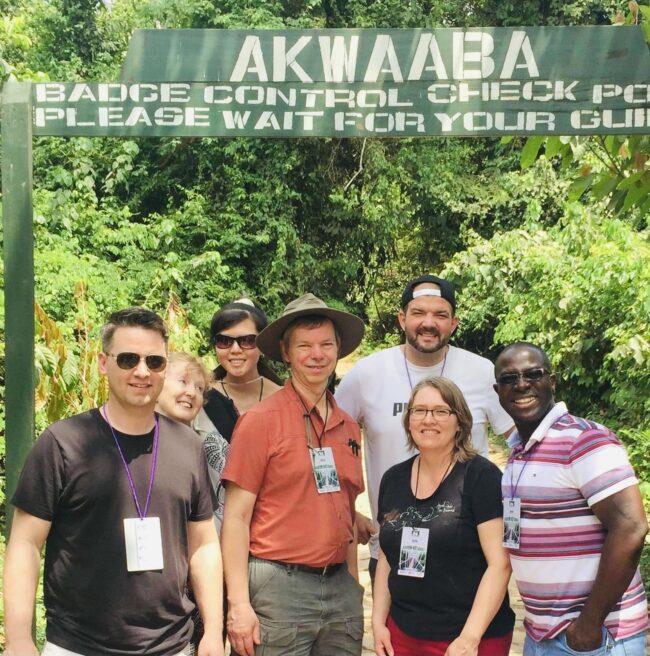
When to Leave the Dance Floor.
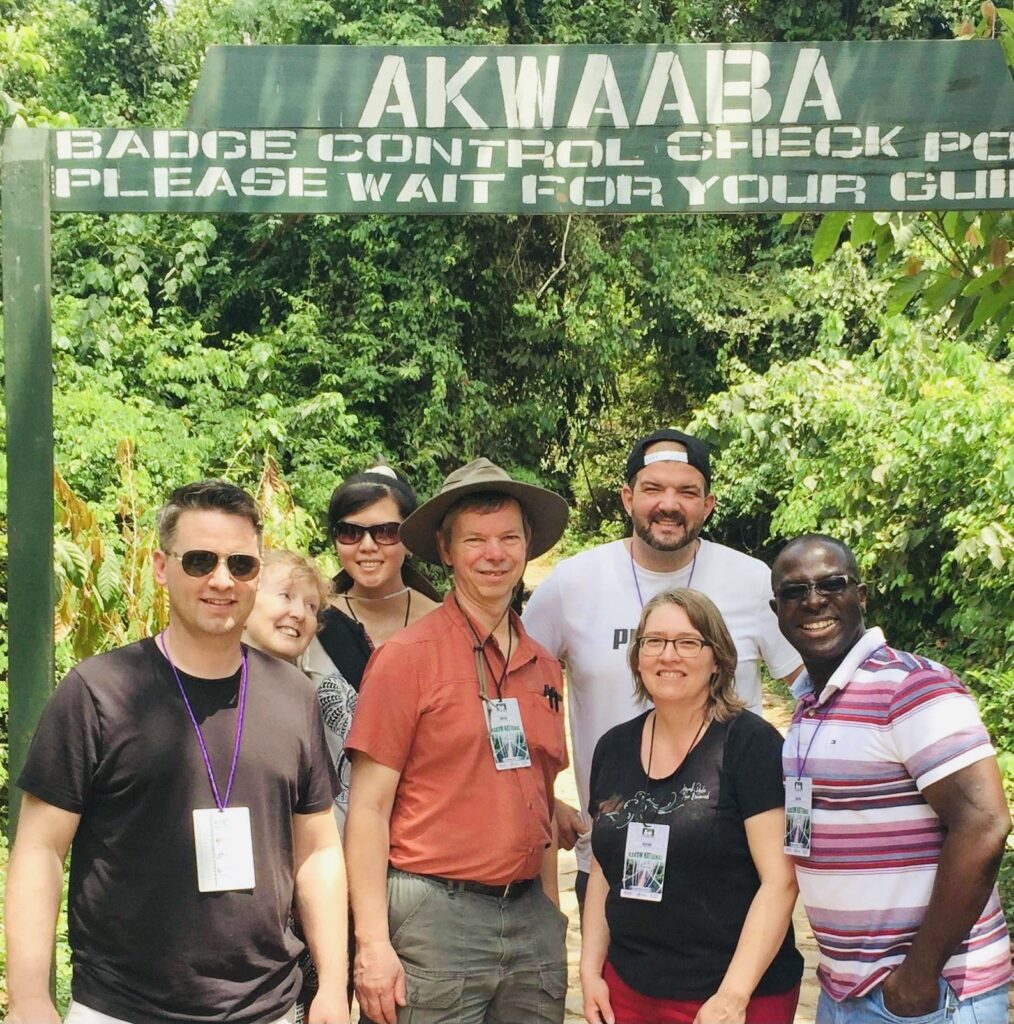
Visiting the Kakum National Park in Ghana with my senior leaders, hailing from six different cities in Canada. Fun fact: the famous canopy walk at this park was built by two Canadian engineers, assisted by a Ghanaian crew.
This month I clocked eight years as president and CEO of a strategic Canadian charity in the international education space. I was headhunted for the role and felt privileged to be the first ever black president of our almost 40 years old organization. We provide hospitality, faith exploration opportunities and leadership development for the over half a million international students in Canada to be empowered to impact the world. I’ve had the privilege of leading about 90 incredible staff across 23 cities from coast to coast–Canada is the second widest country on earth after Russia–and oh yes, we have a staff family serving in Australia too.
SO WHY ARE YOU LEAVING?
In the first couple of years under my leadership, we grew by about 70% (short of my 100% goal) in new staff and new fields, expanding into about a dozen new cities, extending coast to coast for the first time in the organization’s history. There’ve been many more exciting things that have happened, including seeing such a rich diversification of our staff to about 15 nationalities. One of my greatest joys has been to see former international students becoming leaders of our work in cities, regionally and even in senior leadership. Every quarter we chronicle story upon story of incredible impact on students/scholars by staff and volunteers and impact of our students and alumni around the world, from Australia to Zimbabwe! We’ve seen an organization little known organization gain significant recognition in the international education space in Canada and abroad. Together with the leaders and staff, we worked to move organizational health from OK to healthy to flourishing (as independently adjudged by a third party firm). When I hear of CEO versus board tussles I cringe and thank God that this has been far from my experience. I’ve had such a congenial and synergistic relationship with the board, which has rotated through four chairpersons over the period I’ve been president.
If everything is going as well as I claim, then why am I leaving? My work is done! I believe every leader has a particular purpose to a particular people in a particular place for a particular period and when your work is done, you pack up and go, leaving the place and people better than you found them. I had initially been approached for this role in late 2012 and had laughed it off, especially since I was not only running The HuD Group, which had just received charitable status in Canada, but was also doubling as interim pastor for the Montreal Chinese Alliance Grace Church. Eventually I did take the five-hour flight from Montreal to Calgary to interview with the board. When Anyele and I prayerfully decided to make some adjustments and finally accept the board’s offer, I specifically stated that I planned to do this presidency for three to five years. In fact, I ensured it was clearly spelt out in the documentation. Well, guess what? It’s been three plus five years. It’s time to go!
MUSIC AND DANCING WITH GRAPHS
It is time to leave because my particular purpose to a particular people in this particular place for this particular period is done. As a wise saying in Africa goes, you leave the dance floor while people are still enjoying your dance. What Africans say so well idiomatically, Westerners tend to express graphically. So below is a pictorial illustration of what I’m saying.

Just before the peak is when your dance is still being enjoyed. That’s when you leave the dance floor.
While the above graph refers to the life cycle of any organization per se, it is similar to the organizational leader’s cycle too. Don’t wait to peak, let alone to get into decline and eventual death. That is not great for your leadership but even worse, not good for an organization you supposedly believe in (and even love). Just before the peak is when you collaborate with the ‘DJ’ (stakeholders) to start another song i.e. launch another initiative, start a new programme, launch a new organization etc. Just before the peak is when your dance is still being enjoyed so you either start another song or gracefully leave the dance floor!
By the time one hits the peak itself, you are stretching it. Folks are beginning to get tired of your moves. After the peak, it’s all downhill, babe! And no matter how hard you dance (in spite of how very tired you might be) no one’s excited anymore. Not only have eyes started rolling all the way into the head, some may even have begun yawning by now. Bored. Yet, some leaders still don’t get it! Whether it’s because of the adrenaline rush on the dash floor or the perks of the position, they keep dancing and dancing and dancing, while they keep losing the audience until the music is over! Some even keep dancing after the music is over, dancing to the music in their heads. It’s a fight together them off the dance floor! If you don’t leave the dance floor while people are still enjoying your dance, at least leave while the music is still playing! Worst case scenario, far from ideal, leave when the music is done.
A POLITICAL CONCLUSION
Knowing when to leave the dance floor is more of an art than a science; it’s a soft thing akin to discernment and intuition. The greatest leaders like Nelson Mandela have it; they just know. When everyone was urging Madiba to do a bonafide and very welcome second term in office as South Africa’s first black president who had had a good run, he declined. “No, please.” Nelson Mandela left the dance floor while we were all not only still enjoying his dance, we were urging him on for more moves!
Knowing very well that some leaders wouldn’t have what it takes to leave the dance floor even when it’s obvious, many spheres of society have term limits on executive roles. Most political jurisdictions have a maximum of two four-year terms. As an African, I’ve been embarrassed by how many of our leaders haven’t had what it takes to gracefully leave the dance floor while we were still enjoying their dance. Mandela, unfortunately, is more of an exception than the rule. As a former United Nations peacekeeping soldier, I’ve tasted first hand the horror of the ravages of civil strife and war when leaders don’t want to leave the dance floor even after the music is over. I hate it!
I join those concerned about the “pandemic of ‘third terminism‘” in Africa, including in the West African country I served in as a U.N. Peacekeeper from June 2008 for a year and lost two of my medical colleagues to death. Oxford defines ‘third terminism’ as the phenomenon of leaders seeking to break constitutional term limits—usually set at two terms in office—to secure a third term in office. The phrase has also been used more broadly to refer to leaders who refuse to leave power. This isn’t uniquely African; it is simply human. Recently, Putin has done it in the east and in the west, Trump did not want to leave the floor when his music was over. In fact, it was Franklin D. Roosevelt’s ‘third terminism’ (he won, even a fourth!) and the popular fallout about the concept of a long-term president that led to the ratification of the 22nd amendment in 1951 that “No person shall be elected to the office of the President more than twice…”
According to the National Constitution Centre, “Franklin Roosevelt wasn’t even the first Roosevelt to seek a third term in the White House. His distant cousin, Theodore Roosevelt, ran unsuccessfully as a third-party candidate in 1912, after declining to run in 1908. President Ulysses S. Grant also sought a third term in 1880, but he lacked enough party support to get a nomination.”
George Washington, the first U.S. president, had set the two four-year terms maximum precedent in 1796 when he declined a third term. In 1799, a friend urged Washington to come out of retirement to run for a third term. But as I earlier asserted, the greatest leaders know when to leave the dance floor–and stay off! Washington’s voluntary decision to decline a third term, like Mandela’s voluntary decision to decline a second, was apparently seen by many people as a safeguard against the type of tyrannical power yielded by the British crown during the Colonial era.
In my next article, I shall share about how to leave the dance floor in grand style (some call it ‘succession management’). In the mean time, you, my friend, now know when to leave the dance floor–at best when people are still enjoying your dance; or at least, while the music is still playing!

